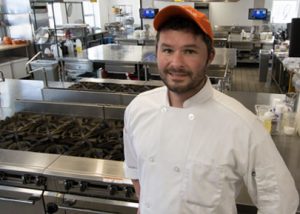
A hectic newsroom isn’t exactly where one would expect to come across food studies students, but that’s just where you’ll find them at the LongHouse Food Scholars Program in Upstate New York. The two-week residential program describes itself as a “food media boot camp” that provides hands-on training in writing and multimedia, as well as mentoring and networking opportunities for aspiring food journalists, activists, academics and entrepreneurs. Food studies alumnus Collin Townsend ‘17 says the LongHouse Food Scholars Program gave him a broad range of learning experiences, as well as valuable connections he still corresponds with.
Townsend graduated from the Culinary Institute of America in 2011 and worked in New York City as a professional chef before moving to Syracuse in 2014 to open his own restaurant. Still, Townsend felt something was missing. He decided to pursue higher education, and was drawn to the food studies program at Syracuse University.
Syracuse University’s Falk College takes a unique approach to food studies. With a specific focus on food as a system, the program incorporates topics such as food production, governance, sustainability, and security. “Food is such a complex issue, with dynamic ties to one’s culture, family, and status within society,” says Townsend. “Every aspect of human society, one way or another, is impacted by food. If you find yourself wondering why there are gender disparities, you can look at food. If you question why there are different classes within society, food can shine a light on the subject. If you have ever just looked down at your plate and thought, ‘Who the heck grew this?’ food studies can help explain it.”
Through his coursework, Townsend says he has been exposed to a number of fascinating topics. For him, the most interesting has been food sovereignty. “Empowering people and communities to have total control over their food in every shape and form from seed to plate is a truly remarkable theory that I have found to be a righteous cause to advocate for.”
One of today’s most pressing global issues, Townsend believes, is the consolidation of food production. “Consolidation within the agriculture, processing, production, and marketing sectors has put enormous power into a very small number of corporations’ hands,” he explains. “While this has made food more readily available than ever before in human history, it has also created a scary dynamic in which most humans are completely removed from what they put in their body.”
Townsend says that the mentorship of his professors in food studies has inspired him to continue his education and become a professor. “A large number of people view food more as an inconvenient necessity, rather than something that makes us uniquely human,” says Townsend. As a professor, Townsend hopes to share his passion for food with his future students.
